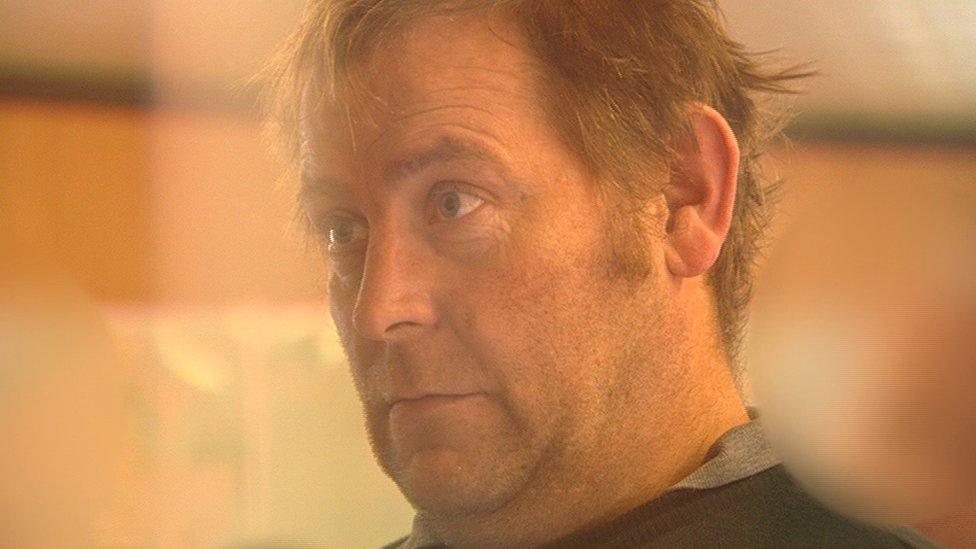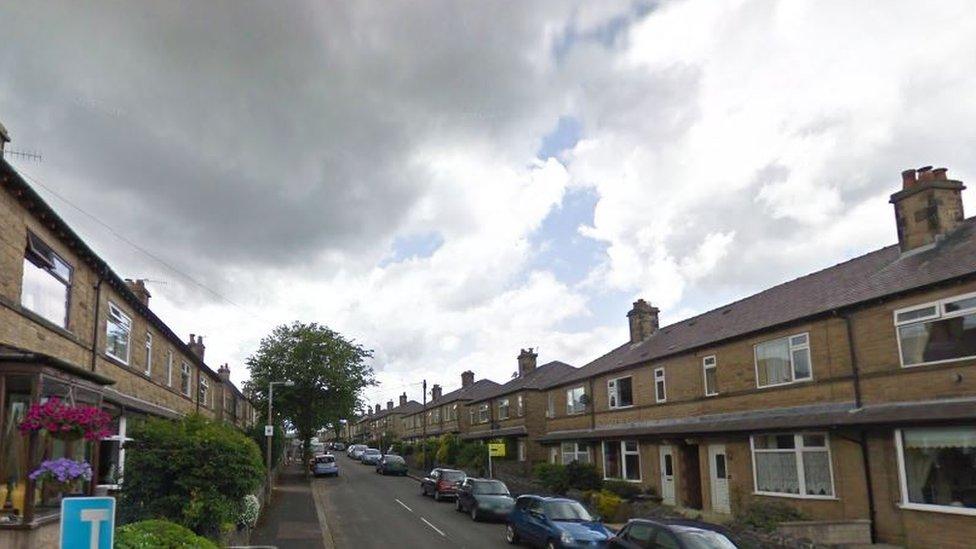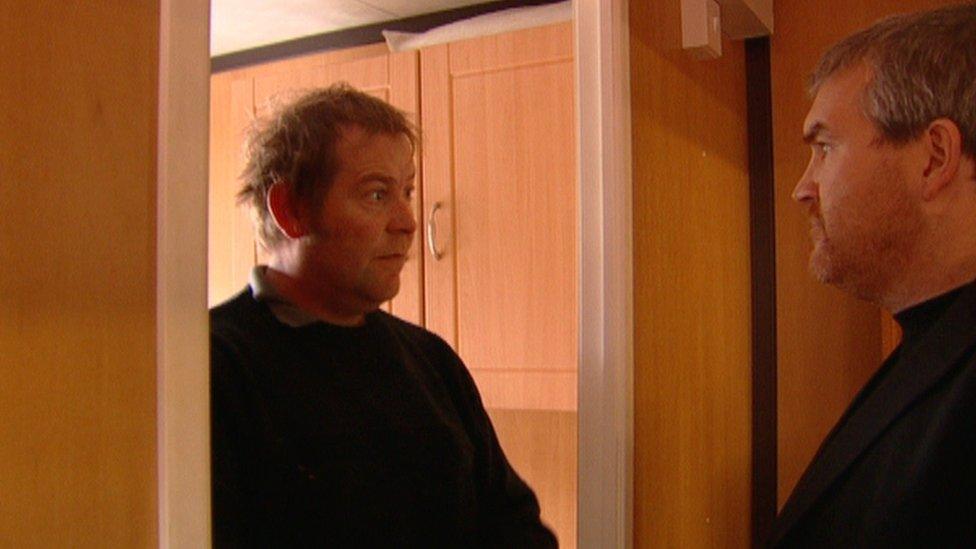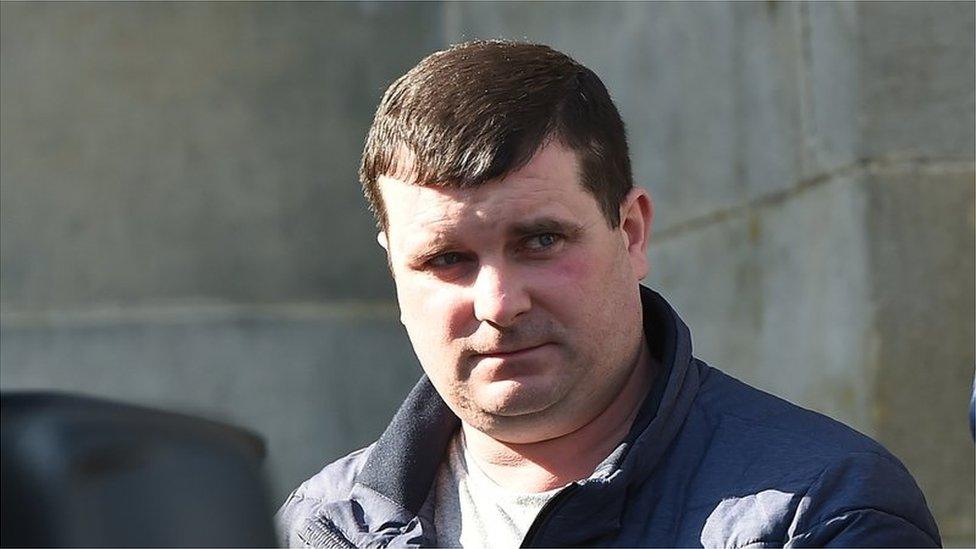Cyril McGuinness: Kidnap suspect died of natural causes after police raid
- Published

Cyril McGuinness - known as "Dublin Jimmy" - was believed to have organised an attack on Northern Ireland businessman Kevin Lunney
A man who suffered a cardiac arrest during a police raid died of natural causes, a jury inquest has found.
Chesterfield Coroner's Court was told Cyril McGuinness collapsed at a house in Buxton, Derbyshire, in 2019 and was pronounced dead in hospital.
The house was raided as Mr McGuinness was linked with a "serious" kidnap and assault in Northern Ireland.
The jury said the raid was a "possible" contribution to his death but the inquest heard he was in poor health.
Derbyshire Police had been asked to search the house by the Police Service of Northern Ireland, which was investigating the kidnap case.
The jury of eight women and three men was told the property was raided as part of inquiries into "violence thought to involve criminal gang activity", but was not informed that Mr McGuinness was believed to have organised the attack on Northern Ireland businessman Kevin Lunney.
Quinn Industrial Holdings director Mr Lunney was kidnapped outside his Fermanagh home in September 2019 and seriously assaulted.
A court heard Mr Lunney was confronted by a gang as he returned from work.
His car was rammed before being set on fire, being Mr Lunney was bundled into a car boot and driven to a farm across the Irish border in County Cavan.
There, he was tied up inside a horse box, beaten, and slashed on the face and chest with a Stanley knife. The initials QIH were carved into his chest. He also had his leg broken with two blows of a wooden bat.

The inquest heard Mr McGuinness gave no warning of ill health before collapsing at Rockfield Road
During the raid on Mr McGuinness' house on 8 November 2019, the 57-year-old was handcuffed but cooperated with police and gave no warning he was in poor health before he started suffering breathing difficulties.
He was pronounced dead at Stockport's Stepping Hill Hospital at 09:55 GMT.
Pathologist Guy Rutty earlier told the inquest: "His heart is so bad that he can literally drop down dead at any second."
Jurors were told it was the police's intention not to arrest Mr McGuinness unless evidence was recovered which would have justified the move.
'Physiological stress'
The jury's verdict stated: "The entry, search and detention made a possible contribution to Mr McGuinness's death.
"The reason for this decision is that the jury cannot completely rule out that the entry, search and detention did not cause physiological stress reactions.
"However the jury wish it to be noted that also from the evidence shown there is a very strong indication that Mr McGuinness could have passed away at any given time."
After the hearing, the Independent Office for Police Conduct (IOPC) said its investigation found the force used by Derbyshire Constabulary in the raid was "reasonable in the circumstances".
IOPC regional director Derrick Campbell said: "Our sympathies are with the family of Mr McGuinness at this extremely sad time for them.
"We found no performance issues for any police officers involved. Evidence we gathered supported officers' accounts that after Mr McGuinness was handcuffed he was comfortable with the process.
"He was provided with a cup of tea and taken outside so that he could smoke a cigarette. Prior to Mr McGuinness becoming ill, there was no evidence that the police were aware of his pre-existing heart condition."
The IOPC added that there was no requirement that the whole raid be filmed but said it had recommended to the force that at least one officer should be recording with body-worn cameras at any one time as it found officers had "switched their devices off at various stages during the search".
Three men convicted of abducting and torturing Mr Lunney were given sentences ranging from 18 to 30 years in December 2021.

Who was Cyril McGuinness?

A convicted smuggler, Cyril McGuinness was known as "Dublin Jimmy" and had an extensive criminal record.
He was exposed in an investigation by BBC Northern Ireland's Spotlight programme in 2004 into the illegal transport of waste.
In 2007, he received a suspended sentence after he admitted 22 charges relating to the illegal transport of waste from the Republic of Ireland, through Northern Ireland to Scotland.
In 2011, he was extradited to Belgium to serve a seven-year prison term for stealing lorries and cranes that were brought to Ireland.
He was described in a European extradition warrant in 2008 as an "active member of an Irish criminal organisation".
In April that year, he was stopped by Serbian police near the Croatian border - when they realised he was subject to a Europe-wide warrant he was extradited to Bruges.
He faced charges in Bruges but left the country after being granted bail and was convicted in his absence.

Follow BBC East Midlands on Facebook, external, Twitter, external, or Instagram, external. Send your story ideas to eastmidsnews@bbc.co.uk, external.
Related topics
- Published3 October 2022

- Published18 January 2022
